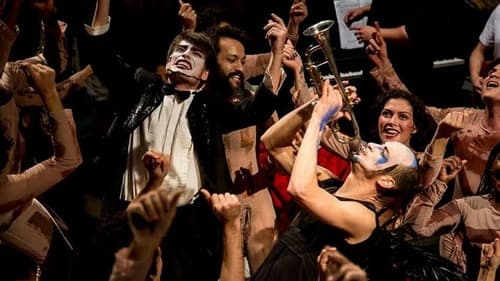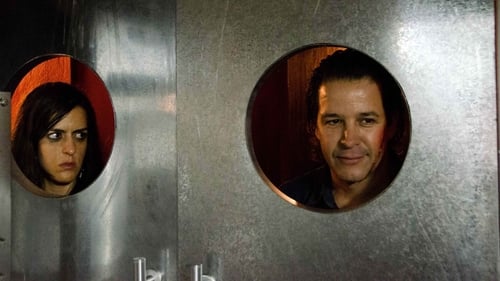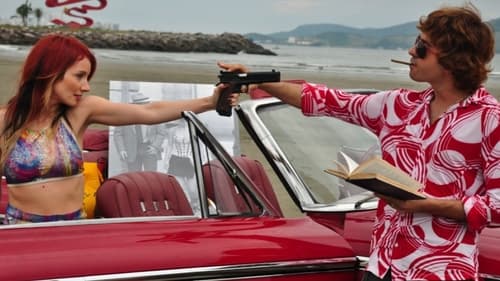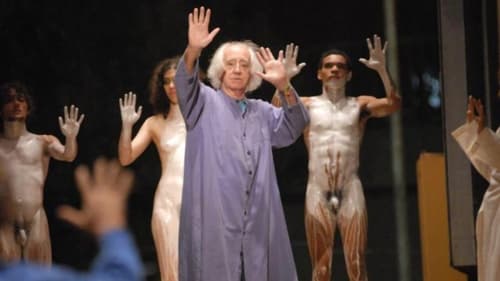
Self
In six decades, Teatro Oficina has done more than revolutionize theatrical language in the country: the aesthetic influence of José Celso Martinez Corrêa's company extends from Tropicalism to the renewal of Brazilian audiovisual languages from the 1960s onwards. The film revisits a story that it involves personalities such as Caetano Veloso, Glauber Rocha, Lina Bo Bardi, Chico Buarque and Zé do Caixão, brings together scenic art, ecology, architecture and sexuality, and mixes art and life in the search for a Brazilian based language.

Returning early from his vacation after the Carnival period to investigate the murder of a young French tourist, Breno Wanderley is faced with possible reflections of his own history from which he cannot escape. Between Ash Wednesday and post-Carnival Sunday, Breno tries to unravel the crime and sees in his son, also called Breno, a chance to reinvent himself in a broken and sullen city.

Francin

Nuno
A restaurant owner going over the edge when an armed robbery is attempted at his establishment. He holds everyone captive at gunpoint – criminals and customers alike – and situations corrode into a nightmare state, guided by manipulation and raw compulsion.

Sergio
남편과 네 아이와 함께 살아가는 평범한 주부 이레네. 큰 아들이 프로 핸드볼 선수로 스카웃되어 독일로 떠나게 되면서 이레네는 아내나 엄마가 아닌 그녀 자신으로서의 삶을 준비하기 시작한다. 일상에 찾아온 변화를 통해 나와 가족의 의미를 잔잔한 감동으로 전해주는 드라마.

Berro
집안 배경이 너무나도 다른 두 어린 남녀가 카니발 기간에 재회한다. 수년 만에 만난 이 둘은 순간의 잘못된 선택으로 퍼레이드 조형물 안에 남몰래 숨어든다.

Cândido
Young directors are filming “The Exhibitionist” in the middle of a farm in a paradise-like region. The film poetically investigates the Brazilian soul, with the Amazon as the center of the world, reflecting on existential issues, the right to sexual freedom and individuality.

Pedro

Junior
Junior, as he’s known, since he’s essentially still a child, seems to be having a tough time getting on in life. He shares cheap lodgings with another fellow and earns money doing strenuous night shifts at a warehouse. It’s no surprise that he lives for football and desperately hangs onto the dream of perhaps every Brazilian kid – to become a famous player. Although he trains hard with his amateur team, he’s not one of the best. He won’t admit to the mounting jealousy he feels as he watches his talented friend doing extremely well on the pitch. What’s more, his prospects don’t look so rosy now that his young girlfriend Carine is pregnant, and he also has to deal with her dominant mother poking her nose in...

Palito
A young man on leave from prison, his straitlaced brother, his best friend, a rookie cop and a young actress collide over the course of 72 hours.

Soldado Gusmão
Paulete, the star of a daring theater group, is visited by his military brother-in-law, the young Fininha. A torrid relationship arises between the two, and now the soldier must deal with the prevailing repression during the Brazilian military dictatorship.

Jorge, bastard child of the infamous Red Light Bandit, decides himself to pursuit a life of crime after meeting with his father, who has been incarcerated for the last 30 years.

From 2000 to 2007, Teat(r)o Oficina Uzyna Uzona worked on the staging of Euclides da Cunha's epic book, Os Sertões, which describes the 19th Century War of Canudos in the Brazilian "sertão"(backlands). The result was the pentalogy of plays: A Terra (2002), O Homem I (2003), O Homem II (2003), A Luta I (2005), and A Luta II (2006). This first play is a carnival opera, the actors are the earth, the vegetation, the wind, the animals, the rivers, the drought. It reveals the most intimate secrets of nature, that also vibrate in the human and trans-human arteries. This work enriched by the experience that the subsequent works brought gains an updated insight into the human interference in the environment. Destructive power is proportional to financial power, and the discussion about the way space gets occupied was brought to the forefront, including the real-estate boom that surrounds today not only Teatro Oficina, but the whole world, now hotter and more arid.









